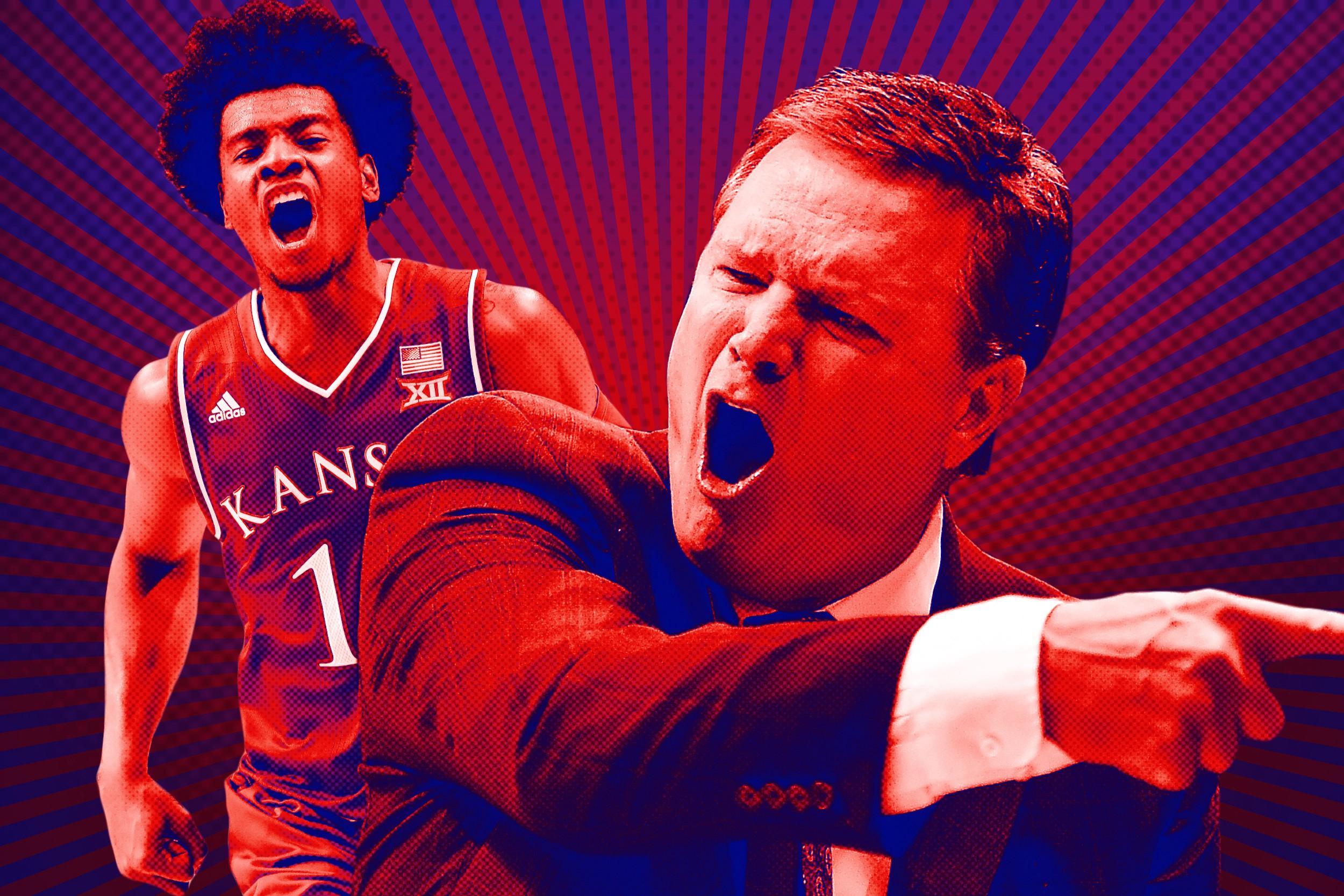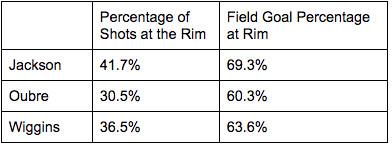The Jayhawks’ Newly Modern Dominance
Kansas is on the verge of its 13th-straight Big 12 conference title. Winning may stay constant for the school, but these Hawks aren’t playing the way you’re accustomed to seeing them.
With a dramatic 67–65 win at Baylor on Saturday, Kansas opened a three-game lead in the Big 12 standings with only four games remaining in the season, all but clinching its 13th consecutive conference title under Bill Self. The Jayhawks’ consistency speaks to the culture Self has built in Lawrence, as well as the sheer amount of talent he brings in every year. It also speaks volumes about his ability to adapt. Kansas is playing a dramatically different style of basketball this season compared with how Self has dominated the conference in years past. A coach who made his name throwing the ball into the post is spreading the floor with shooters and running pick-and-rolls. He’s winning with small ball. One of college basketball’s blue bloods is playing NBA-style basketball, and it could be the key to its first national title in nearly a decade.
“Well, I would have two 7-footers and a couple other things,” said Self with a wry chuckle after the game when asked about his team. “But as far as a mental toughness team, yeah, I would take this team and go to the house and let it ride however it goes.”
Kansas has churned out over a dozen NBA big men under Self, most notably Joel Embiid and the Morris twins, Marcus and Markieff. The Jayhawks have almost always had multiple NBA-caliber big men on their roster, bludgeoning opposing teams with size and interior scoring. However, this season’s team was thinner up front than usual, and that was before freshman center Udoka Azubuike’s season-ending wrist injury in December. Self had no choice but to embrace a more wide-open style of basketball. Instead of playing two traditional big men for most of the game, he is using four perimeter players around one big man.
Kansas still has a center, but the power forward is gone, replaced by a power wing. It’s the same change the vast majority of teams in the NBA have made over the last few years, but it has been slower to come at the college level. The biggest reason is there aren’t many players in college basketball with the size to guard bigger players in the post and the skill set and athleticism to play out on the perimeter. Players like that don’t last very long before being snapped up by the NBA, and the guy playing the power wing position for Kansas, freshman Josh Jackson, will be no exception.
At 6-foot-8 and 207 pounds with a 6-foot-10 wingspan, Jackson is the best athlete in a loaded class, and he could end up being a top-three pick in this year’s draft. Self is using him much differently than he used Andrew Wiggins and Kelly Oubre Jr., his previous two one-and-done wings. Instead of walking the ball up the floor and being locked into a more conservative offense built around playing high-low in the post, Jackson is playing in much more space in the half court, spotting up off the pick-and-roll and looking to run at every opportunity. As a result, Jackson has an easier time getting to the rim than his predecessors, and he has less trouble finishing once he gets there (all numbers courtesy of hoop-math.com):

Jackson isn’t nearly as good a perimeter shooter as either Oubre or Wiggins, but it doesn’t matter because he’s being used in a role that makes it easier for him to take advantage of his overwhelming athletic advantages. Sliding him up a position creates a domino effect in the Kansas rotation, with more room for shooting and playmaking elsewhere. Jackson plays next to two point guards, senior Frank Mason and junior Devonte’ Graham, as well a lights-out shooter in junior Sviatoslav Mykhailiuk, all of whom make the game easier for him on the offensive end of the floor.
“I think the best pro prospects [in 2014 and 2015] were obviously our tall wings, but the best college basketball team is a team [with guards] that can get inside and make plays for others,” Self told reporters last season. “You look at [Wiggins], you look at Wayne [Selden currently playing in the D-League and whom you might remember for this dunk], you look at Kelly Oubre; you’ve got three really good, big wings that we’ve recruited over the last three years. But to play two of those guys together at once means you’re really losing a lot of ball handling [if you have two big men on the floor].”
Jackson isn’t the only player who benefits from all that extra space on the floor. The Kansas offense is powered by Mason, one of the front-runners for the Wooden Award despite being a lightly regarded recruit coming out of high school who had originally committed to Towson. Look at the massive jump in Mason’s numbers between his junior and senior seasons. It’s partly a natural result of his development and maturation process, but it’s also a product of the change in the Kansas offense:

For the most part, going smaller almost always juices an offense; the problem is what it does on the other side of the floor. The key to making small ball work for Kansas is what Jackson does on defense. That’s where he made his bones on the AAU circuit. Duke freshman Jayson Tatum is one of the best one-on-one scorers in the country, and Jackson made his life miserable when the two faced off at the practices for the McDonald’s All American Game last year. One Eastern Conference executive told me that the top players in his class are scared of what Jackson can do defensively.
Jackson gives up a lot of size as a power forward, but his combination of athleticism, motor, and toughness allows him to overcome it. He put on a defensive clinic in Kansas’s win against Baylor, which has one of the biggest frontlines in the country in Jo-Lual Acuil Jr. (7 feet, 220 pounds), Johnathan Motley (6-foot-10, 230 pounds) and Terry Matson (6-foot-8, 230 pounds). Jackson spent a lot of the game guarding Motley, a potential first-round prospect in the upcoming NBA draft who is averaging 16.8 points and 9.5 rebounds on 51.7 percent shooting this season. Motley finished with 19 points and nine rebounds on Saturday, but he needed 21 shots to do it.
“I thought Josh had another good complete game with the exception of rebounding,” said Self. “We asked him to guard a seven footer and he’s used to guarding guards, so I thought he did a really nice job.”
Playing good defense in the post starts before the ball ever gets inside, and Jackson does a great job of fighting for position and preventing the easy entry pass, fronting his man and using his athleticism to deny the lob:
Just as important against Baylor was Jackson’s role as a help defender. When he wasn’t guarding Motley, he was often on the 7-foot Acuil. In those situations, he would liberally help off Acuil, who isn’t much of a threat on the offensive end of the floor. Motley struggled with the aggressiveness of Jackson’s double teams, turning the ball over six times and never really getting comfortable about when and where to make the right pass.
“[Jackson] did a good job with rotating, trapping, and having high hands and bringing energy on the defensive end,” said Mason.
Jackson’s athleticism allows him to play much bigger than his size would suggest, and an opposing offensive player, no matter how big, can never be sure of where he’s going to be on defense. He had four blocks against Baylor, and he’s averaging 1.8 steals and 1.1 blocks per game this season. He’s a defensive difference maker in a way few perimeter players are at the college level.
Baylor was a great test for Kansas because the team was so well equipped to attack the Jayhawks’ lack of size. Scott Drew’s team has an NBA-caliber big man (Motley), a point guard who can control tempo and get the ball inside (Miami transfer Manu Lecomte) and 3-point shooters who can punish teams for packing the paint. The Bears narrowly lost both games to Kansas this season. If they couldn’t make the Jayhawks pay for going small, there may not be a team in college basketball that can.
And while beating Kansas with bigger lineups is hard, keeping up when you’re downsized along with them is even harder. There are few perimeter players in college with the physical tools to match up with Jackson. One of them, OG Anunoby of Indiana, helped hand Kansas one of its three losses this season. (Anunoby is now out for the season with a knee injury.) The other two losses came in overtime against Iowa State and in a road game at West Virginia, one of the toughest places to play in the country. The Jayhawks’ résumé is even more impressive when you look at their wins. They beat Duke on a neutral floor (albeit without Tatum), Kentucky in Lexington, and Baylor in Waco.
Self has 12 Big 12 championships under his belt, but he has made the Final Four only twice since 2005. While there’s obviously a ton of luck in a one-and-done tournament, part of the problem may be a lack of high-end talent. None of the 21 NBA draft picks that Self has coached at Kansas has made an All-Star team, although presumably Wiggins and Embiid will change that in the near future. Embiid was hurt in his only season in college, and Wiggins wasn’t on an offense that maximized his game. But times change, and coaches adapt. Self isn’t making the same mistake with Josh Jackson.

